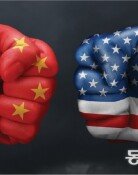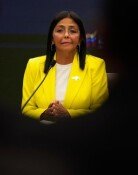[Editorial] Is inter-Korean economic cooperation in progress under the surface?
[Editorial] Is inter-Korean economic cooperation in progress under the surface?
Posted October. 27, 2000 20:52,
No small amount of adverse repercussions is created by a lack of cooperation and discordance between the different branches of the government. The highest decision-making body for inter-Korean affairs is the National Security Council (NSC) where the ministers of unification, foreign affairs, defense and the director of the National Intelligence Bureau (NIB) hold a meeting once a week. But it appears that good cooperation between those branches of government is hard to come by.
In particular, we have many queries about our projects for economic cooperation with North Korea. What are, if any, are the principles or criteria with which such economic projects are decided and executed? Minister of Unification Park Jae-Kyu's dismaying statements Thursday at a university institute's meeting on the building of automobile factories in Sariwon, North Korea, are making us greatly confused. Domestic car manufacturers' negative response to the project accentuates our skepticism over South-North economic cooperation. Added to that are recent reports that winter undergarments worth some 45 billion won are still, for some unknown reason, stored in the supplying firms' warehouses though they were supposed to be shipped to North Korea.
Minister Park was quoted to have said that, through a private channel of communication, he heard about the car factory projects to be built in a 400 thousand pyong (1 pyong equals 3.9 square yards) area. But, domestic firms capable of undertaking such a project all stated that they have no knowledge of it. Ministry of Unification officials in charge of coordinating and approving any inter-Korean cooperative projects have also confirmed that no domestic car manufacturers have so far made applications to visit the North for site inspections for such projects. The glaring discrepancy between Minister Park and the car manufacturers as well as the ministry officials regarding the matter make us all bewildered about inter-Korean economic cooperation.
Now, it behooves Minister Park to clarify the grounds for such statements. His reference to personal channels of communication is rather dismaying because he is the Minister in charge of inter-Korean affairs. As such, he should know about such a huge project not via private channels but by official lines of communications. It just does not make any sense. If what he said is true, it will only mean that his Ministry is alienated from taking charge of the economic agenda for South-North cooperation.
The issue of winter undergarments in warehouses also discloses the disorderly aspects of inter-Korean cooperation. The industries to supply winter underclothes claim that the firms were to supply the clothes by the initiative of the Federation of Korean Industries (FKI) which, according to the firms, was in charge of the project to aid North Korea, but the FKI denies this, saying that the project was cancelled in the planning and consideration stages.
In our view, the underwear manufacturing industries would not produce such an enormous volume of clothes worth 45 billion won based on a loose and uncertain commitment. Rather, we suspect that the industries were assured of clear commitment to the underwear project, but something must have gone wrong in the process. As a consequence, it is only small-scale business firms that will suffer damages from the situation. Full investigations into what has resulted in such a lamentable situation must be carried out. Due measures to compensate the firms must be taken.
Some critics point out that the reasons for such disarray in inter-Korean economic cooperation originate from the conflicts between the Ministry of Unification, the government's nominal branch in charge of its North Korea policies, and the National Intelligence Bureau, which exercises de facto exclusive authority in informal contacts with the North. In fact, there is no small amount of complaints in the Ministry of Unification for the alienation, or the NIB's usurpation, of their functions for inter-Korean affairs. Mutual cooperation and harmony between different government branches are imperative for the transparency of our North Korea policies.






![[횡설수설/신광영]용산 대통령실 사우나와 비밀통로](https://dimg.donga.com/c/138/175/90/1/wps/NEWS/IMAGE/2026/01/04/133090799.1.jpg)
